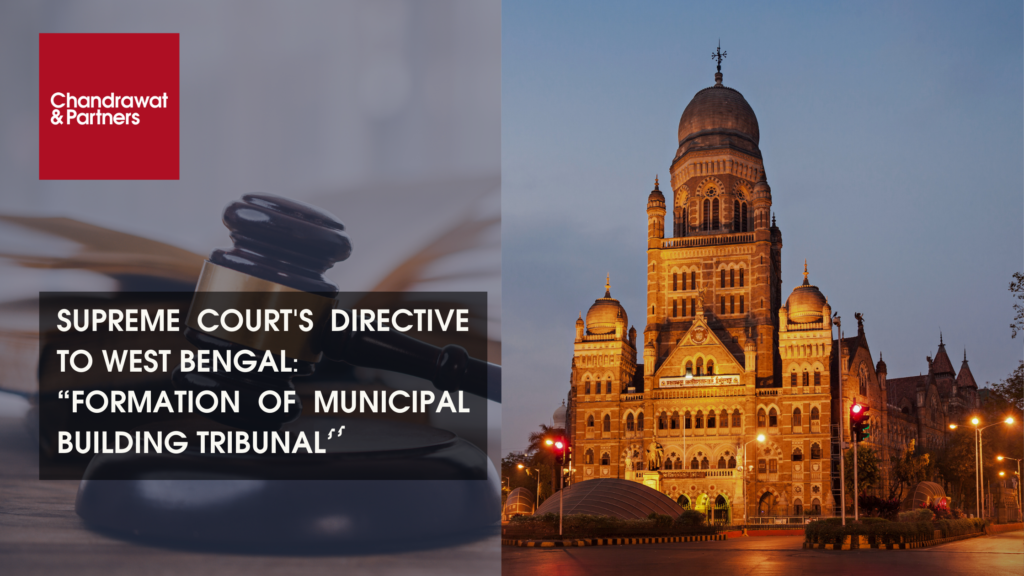Home > Recent Judgements > Supreme Court’s Directive To West Bengal: “Formation Of Municipal Building Tribunal”
Sept 20, 2024

SUPREME COURT’S DIRECTIVE TO WEST BENGAL: “FORMATION OF MUNICIPAL BUILDING TRIBUNAL”
On Tuesday, September 17, the Supreme Court of India in the case of Custodian of Enemy Property for India v. Md. Yakub @ Md. Yakub Ansari & Ors. issued a strong directive to the State of West Bengal, instructing it to complete the formation of the Municipal Building Tribunal within two weeks. The Court warned that failure to comply with this directive could result in contempt of court proceedings.
APPEAL UNDER THE KOLKATA MUNICIPAL CORPORATION ACT, 1980
The Kolkata Municipal Corporation Act, 1980, grants the right to appeal to the Municipal Building Tribunal for parties aggrieved by demolition orders related to unauthorized construction. These appeals must be filed within 30 days of the order. Although West Bengal has appointed a chairperson for the tribunal, the lack of appointed judicial and technical members has left the tribunal non-functional. This situation impedes access to justice for affected parties, as they cannot seek redress against demolition orders, highlighting the need for timely formation of the tribunal to uphold legal rights and procedures.
NON-COMPLIANCE WITH PREVIOUS ORDERS
The Supreme Court bench, expressed disappointment over the state’s failure to comply with a previous order from August 9, 2024, which required the formation of the tribunal. The Court observed that, without judicial or technical members, the tribunal remains invalid and the state has not followed the order in its “true letter and spirit.”
In response, the Court granted West Bengal an additional two weeks to appoint the necessary judicial and technical members. The state is also required to submit a compliance report to the division bench of the Chief Justice of the Calcutta High Court. If the state fails to meet this deadline, the High Court has been instructed to initiate contempt proceedings without delay.
CASE BACKGROUND
The case originated from a Special Leave Petition (SLP) filed by the Custodian of Enemy Property for India, concerning the demolition of unauthorized constructions on enemy property in Kolkata. The Supreme Court had previously ordered the demolition of these illegal structures and emphasized that parties affected by the delayed formation of the Municipal Building Tribunal could approach the Calcutta High Court for relief.
In an order dated May 10, 2024, the Supreme Court had stayed a Calcutta High Court decision that had prevented coercive action against unauthorized constructions until the Municipal Building Tribunal was constituted. The top Court directed the demolition process to proceed in compliance with the Enemy Property Act, while also mandating that West Bengal form the tribunal. Despite these orders, the state’s failure to appoint the required tribunal members led to further delays.
CONSEQUENCES OF DELAY
As a result of the delayed formation of the tribunal, aggrieved parties were unable to file statutory appeals against demolition orders. The Supreme Court has now directed that these parties seek redress from the Calcutta High Court.
SUPREME COURT’S FINAL DIRECTIVE
Once the Municipal Building Tribunal is constituted, the Supreme Court has ordered it to prioritize appeals related to demolition orders. Furthermore, the Court requested that all related matters be listed before the Chief Justice’s division bench in the Calcutta High Court to avoid conflicting orders.
The Supreme Court emphasized that it had not issued any interim stay or order to maintain the status quo. All parties involved are expected to comply with the Calcutta High Court’s directions. The court clarified that the opinion is not expressed on the merits of the case, instend it emphasized on the legal processes to move forward in accordance with the prior rulings.
OBSERVATION
This order from the Supreme Court serves as a reminder that Justice Delayed Is Justice Denied. The Court has concluded all related matters, permitting the parties involved to seek recourse from the High Court if they feel the need to do so. Importantly, the Court has not provided any interim stay or instruction to pause the demolition activities or maintain the current state of affairs. This means that demolition can proceed without hindrance.
Furthermore, any directives that the High Court has issued in the past will remain obligatory for the parties involved. If further clarification or guidance is needed regarding these directives, it must be requested from the High Court exclusively. This approach emphasizes the importance of adhering to established legal procedures and the role of the High Court in providing further resolution or clarification on the matter.
For more information or queries, please email us at
enquiries@chandrawatpartners.com




